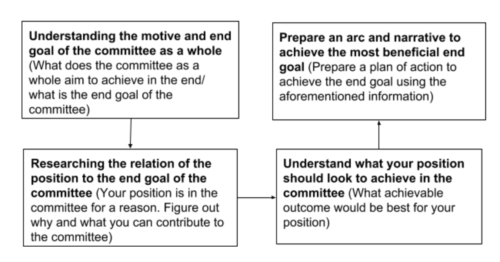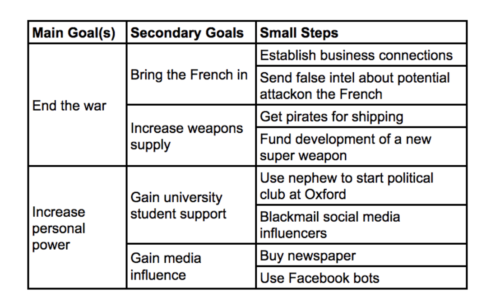
The adrenaline junkies and adventure seekers of the Model UN community more than often have a great love for crisis committees. This isn’t surprising given that the fast-paced action and the idea of facing immediate consequences for decisions made is anything but boring. However, while the thrill of not knowing what is to come next and what the rest of the room is planning may be exciting, versatility and creativity alone aren’t enough – the gavel almost always goes to the delegate who is most researched, prepared, and is the center of the narrative of the crises.
Preparing for crisis committees may seem to be a tricky ordeal given the fact that most decisions made and actions taken to happen in a fast-paced environment where the emphasis lies on the quick thinking and decision making skills of the delegates. But crisis committees – much like any other committee in Model UN – require extensive research and preparation to achieved the desired outcome.
This article aims to provide insight into the research and preparation behind the fast-paced action of a crisis committee to showcase steps that are essential for winning the coveted crisis committee gavel. Different delegates use research differently and, thus, this article is not definitive or exhaustive. However, these steps have been emphasized by chairs and directors worldwide to be the essentials for research and preparation for crisis committees.
Step 1. Researching the background and timeline of the committee
The first step of preparation for crisis committees is the same as that of any other Model UN committee: researching and understanding the background of the committee, agenda, and the timeline of events. The need for background research differs with different types of crisis committees, as some may require detailed research into the timeline of events and the mandate of the committee, while others may require merely an understanding of the work of the committee and its members.
Researching and understanding the background, powers, mandate, and scope of the committee is essential to move forward and make appropriate crisis notes/decisions that are essential for a gavel-worthy performance in crisis committees. Timeline research is also indispensable if the committee has a historical context or is set in a different timeline while research of the maps and area relating to the agenda is necessary for strategic and war crisis committees. Some crisis committees may even require extensive research on lores and the quantitative resources of the committee, but, irrespective of the type of research, background research is the most basic and essential preparation step.
Preparing notes about the background and timeline of the committee which include quantitative knowledge of the resources and tools in the possession of the committee helps to gain an advantage while both preparing crisis notes and in understanding the implications of the crisis updates on the committee.
Step 2. Researching the both portfolio power and personal power of your position
Portfolio powers and personal powers are the two major resources of any delegate in a crisis committee, and research on the same is indispensable in preparation for a crisis committee. More information on portfolio powers, personal powers, and their role in crisis committees can be found here.
Portfolio and personal powers do not only dictate the powers and resources at the hand of the delegate but also help understand the intentions and motives of the position in the committee. Closer research of the portfolio powers showcase the most appropriate steps and decisions that can and should be used to contribute most to the narrative and, in turn, to become a central character of the committee. Meanwhile, closer research of the personal powers showcase the alternative motives and resources available to the position, that the rest of the committee may be unaware of.
Preparing notes on the position, power, and resources of the position, complemented with notes on the alternative motives, connections and powers of the position is essential to ensure that crisis notes and actions taken are detailed, realistic, and impactful.
Step 3: Preparing the arc and narrative that will lead to the most beneficial end goal
Preparing an arc or narrative that will allow for the most beneficial end goal is a preparation measure whose usage varies according to the type of crisis committee. However, preparing a narrative and strategizing with regards to the plan of action in the committee is a necessary step to achieve success and the gavel in a crisis committee.

Mind map for the preparation an arc and narrative
Preparing a plan of action and understanding the desired goal to achieve by the end of the committee helps to understand the most beneficial way to tackle the committee’s agenda and showcases the personal agenda of the position in the committee. While the prepared arc and narrative seldom hold following crisis updates and crisis notes, preparing them helps with understanding the agenda with respect to the motives and goals of the allocated character. It can also help to brainstorm the smaller steps, or individual crisis notes, that will lead to larger goals.

Example Plan of Action
Step 4: Preparing for the alliances and the first crisis notes necessary to form them
Crisis committees, like any other Model UN committee, require teamwork with allies and partners, and strategically suited joint decisions and crisis notes. Understanding both the committee and the motives of others’ positions allows for an understanding of the alliances and partnerships necessary for a good performance in the committee. Knowing the other members of the committee and their agendas helps you understand the alliances that will allow for your position to achieve the most beneficial end goal.
Preparing which alliances you’ll see at the start of the committee is a time-saver, and can help you propel into tackling the crisis directly, without wasting time on determining how to get others to join you.
Concluding thoughts
Preparation and research are the greatest assets and tools of a Model UN delegate, irrespective of committees. The preparation steps put forth in this article aim to fully prepare delegates for the challenges and tasks that they will face as crisis delegates, help them become central characters in their respective crises, and even gavel in crisis committees. While victory is important and is the goal of most if not all Model UN delegates, the thrills of the committee and skills delegates develop with every crisis update are the true and lasting positive outcomes of the committee. Hence, when preparing, remember to have fun in committee and give it your all – because without being willing to learn and adapt, preparation is futile.

